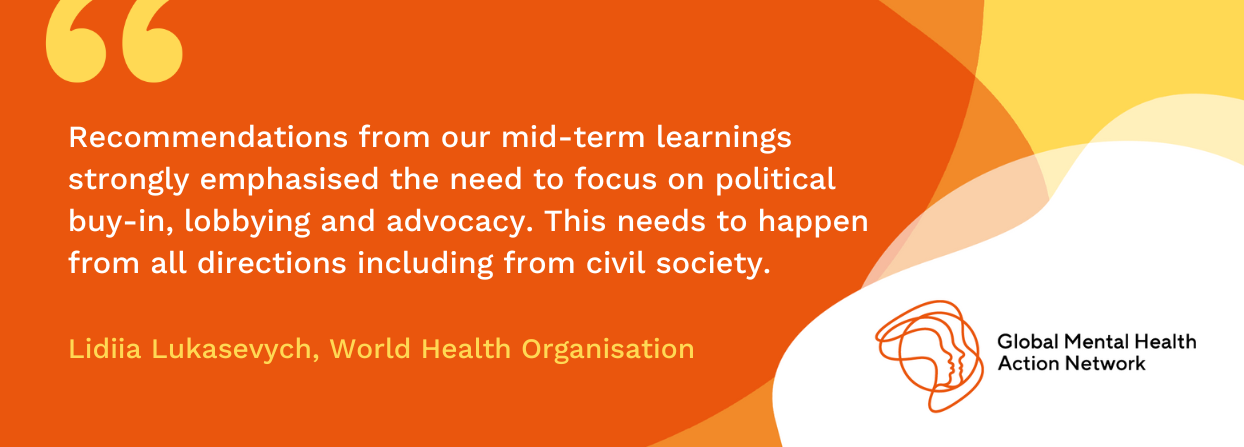Transforming National Mental Health Services
On Tuesday 28th March, the Global Mental Health Action Network brought together a panel of experts to explore how national mental health services can be transformed.
The panellists discussed the key achievements and successes of the World Health Organisation’s (WHO) Special Initiative for Mental Health (SIMH) and outlined some of the barriers to systems-level change that limited progress in the Special Initiative (SI) countries.
Panellists
• Bharti Patel, National Director, South African Federation for Mental Health - South Africa (Chair)
• Alison Schafer, Technical Officer and Program Manager for WHO Special Initiative for Mental Health - Switzerland
• Lidiia Lukasevych, Technical Support to WHO Special Initiative - Ukraine
• Hadeel Alfar, National Professional Officer for Mental Health, WHO Country Office - Jordan
• Mika Salanguit, Deputy Director for Policy and Partnerships, #MentalHealthPH - Philippines
The WHO SIMH was launched in 2019 to address the treatment gap for mental health in low-resource settings. The SIMH is targeting mental health policies, laws, and rights, and working with government agencies to scale up services at the primary healthcare level.
WHO has committed to working with ministries of health for at least five years to help drive systems-level change in nine countries in-line with the country’s specific needs and priorities. The progress in each country is variable, but there have been some significant achievements across the nine SI countries.
Bangladesh has approved a National Mental Health Strategic Plan for implementation and has trained 45 trainers, 61 health workers, and three field coordinators in the mhGAP programme.
Paraguay has seen a 500% increase in coverage in one region through virtual consultations, and Ukraine's First Lady launched the National MHPSS programme and increased service coverage through widespread mhGAP training and the development of community mental health teams.
With the WHO’s support, Jordan has been able to officially integrate mental health in its national policies and national action plan documents.
These documents clearly outline that mental health must be integrated into primary health care (PHC) using the MhGap tool. Issues with privacy and the lack of a referral tracking system continue to limit progress and perceived low trust in primary services due to delays and overcrowding have also made the integration of mental health into primary health care challenging.
Mental health-specific challenges, such as underfunded programmes and the inefficient distribution of the health workforce, have also affected the quality of care provided.
Nevertheless, the expansion of training and supervision services nationwide has allowed approximately 30% of primary care centres in Jordan to provide essential mental health services. This represents a significant achievement and a positive step forward in the provision of mental health care for the people of Jordan.
In the Philippines the WHO worked in collaboration with the Department of Health and with persons with lived experience (PWLE) to create an online e-learning course for PWLE to empower them to become champions and advocates for mental health, while simultaneously addressing stigma and discrimination issues.
This development of this campaign has helped organisations such as #MentalHealthPH foster partnerships with professional organisations across the country, civil society organisations, government agencies and international organisations in a unified effort to drive meaningful change.
“The WHO SIMH gave us more hope that we will be able to achieve universal health coverage for mental health in the Philippines”
Data collected for the SIMH’s mid-term review highlights that the multi stakeholder engagement process and the involvement of PWLE is a key achievement of the Initiative and one of the driving forces for systems-level change.
Additionally, the success achieved at the national level can be attributed to the ongoing collaboration between dedicated WHO personnel in country offices, ministries of health, and senior country-level influencers. While financial support has enabled the strengthening of mental health systems, the lack of clear funding flows continues to hinder the implementation of long-term, sustainable solutions.
To transform national mental health services, Alison Schafer states that we need to include everyone, everywhere, and engage all stakeholders to reach people where they are at.
Bharti Patel of the South African Federation for Mental Health adds that it is important to ensure that mental health care users are also involved in the conversations about systems reforms.
To effectively reflect the needs of the entire population, we must reallocate resources through all layers of the mental health system, says Hadeel Alfar.
Lidiia Lukasevych concludes by saying sustainable reform is not possible without sustained political prioritisation and funding.



